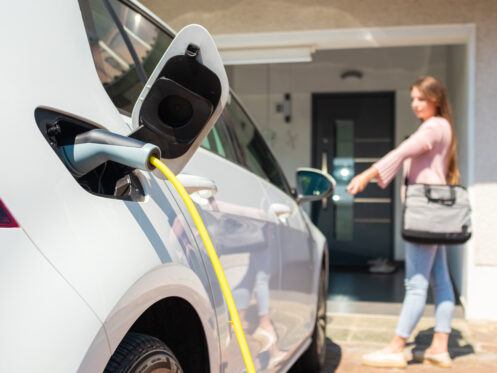The popularity of fully electric vehicles and hybrids continues to grow as more and more people look to lower their carbon footprint and/or save money on their daily commute. For these reasons, many people are seeking to install Level 2 EV charging stations at their homes. Having a home EV charging station is extremely convenient and much cheaper than using public charging stations. If you’re considering adding a charging station to your home, here are some of the main reasons why you need a licensed electrician to handle the installation.
Code Requirements
The National Electric Code requires that all Level 2 EV charging stations be wired to a dedicated 240-volt circuit. When installing a home EV charging station, you will almost always have to add a circuit and run the wiring from the electrical panel to the garage or wherever you’re putting the station. The only exception is if your garage already has an unused 240-volt circuit and outlet. This is extremely rare, and even then, there’s very little chance that the circuit will have the correct type of 240-volt outlet for the charging station.
Local code regulations almost always require you to have an electrical permit when installing an EV charging station and/or adding a circuit to your electrical system. This permit isn’t something you can get on your own. Most places only allow a licensed master electrician to pull an electrical permit. Failing to get the required permit for the work could lead to a large fine and might also present problems if you try to sell your home.
Warranty Considerations
The majority of Level 2 EV charging stations come with a limited manufacturer’s warranty that will cover the charger if it has any defects. Most manufacturers warrant their products for anywhere from one to three years, and you often have the option to purchase an extended warranty if you want your charger covered for longer.
If you read the terms of most manufacturer warranties, you will see that they don’t cover any issues that arise due to improper installation. This means that if you can’t prove that your charging station was installed by a qualified, licensed electrician, there’s an extremely high chance that your warranty will automatically be void.
While the warranty on an EV charging station covers only manufacturing defects, not the installation itself, most electrical companies will warrant the work they perform for at least a year. This is also important since it will give you peace of mind about the work being done properly and assure you that the manufacturer will cover the cost of any additional work if your charger isn’t installed correctly.
Safety
Improper electrical installation can be extremely dangerous. Many electrical issues can cause a major fire hazard. If you try to install the charging station yourself and don’t do everything exactly right, there’s also a high risk that your charger will get ruined or not work as it should. If the charging station and new circuit aren’t wired correctly, other issues could arise with the rest of your electrical system, such as overloaded circuits or flickering lights.
Another major concern is that an improperly installed charging station could seriously damage or ruin your EV’s battery. Most EV manufacturers warrant the batteries on their vehicles for around eight years and will provide a free replacement battery if the original one fails within the warranty period. However, you will likely have to pay for the replacement battery yourself if your original battery failed because you didn’t install your charging station properly. Considering that the average cost of a new EV battery is between $7,000 and $20,000, it means you could end up having to pay far more than you would have if you’d originally hired an electrician to install your charging station.
Electrical Load Calculation
Before installing any model of Level 2 EV charging station, an electrician will always perform what’s known as an electrical load calculation. This essentially involves adding up the wattage and amperage of all of a home’s existing circuits and appliances. A load calculation is important for ensuring that the home’s main electrical panel has sufficient amperage to support another 240-volt circuit.
Many homes still only have a 100-amp service panel, and some older homes only have 60-amp service. A 60-amp panel will never be sufficient to power an EV charging station, so you will be required to upgrade yours to at least 100 amps if you want to install an EV charger.
A 100-amp panel may be sufficient, but it depends on the size of your home and how many 240-volt circuits it already has. If your home has a 100-amp panel and there are already two or three 240-volt circuits for things like central air conditioning, a clothes dryer or a hot tub, you usually won’t be able to add a new 240-volt circuit for your EV charging station.
To support an EV charging station, most homes will need at least a 150- or 200-amp service panel. Even if your existing electrical panel has sufficient amperage, there may simply not be room in the panel to add a new 240-volt double-pole breaker for the new circuit. In this case, you will need to replace it with a larger panel or potentially install a new sub-panel.
You’ll also need to get a permit if you need to have your electrical panel upgraded to accommodate your EV charging station. Replacing an electrical panel requires having the power company shut off the power to your house, and only a licensed electrical contractor can request the power to be shut off. Even if you could do it on your own, it definitely wouldn’t be advisable. Replacing an electrical panel is quite complicated, and there is a serious risk of an electrical fire if all of the circuits and circuit breakers aren’t wired and installed correctly. There is also the risk of electrocution if the work isn’t performed properly.
If you need the services of an experienced, licensed electrical company in Richland Hills, TX or the Dallas-Fort Worth area, HR Phoenix is always here to help. We specialize in all types of residential and commercial electrical installations, and our team can assist if you want to install an EV charging station for your home or business. We can also perform an electrical panel upgrade if needed or take care of any of your rewiring or electrical repair needs. We offer free estimates for EV charger installations and all other services, and our team always takes the time to ensure all work we perform is done safely and meets all code requirements. You can trust that we will go the extra mile to ensure that each of our customers is fully satisfied.
Contact us at HR Phoenix today to schedule a consultation and learn about your options for EV charging station installation.


